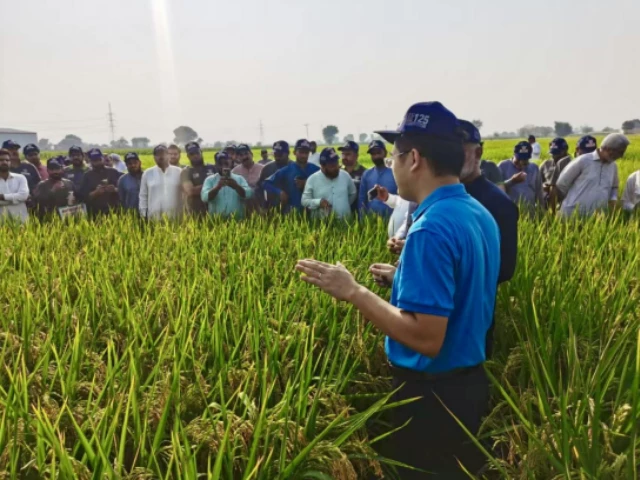China’s Honglian hybrid rice has shown promising results in Pakistan, where the three varieties H13, H14 and H15 have achieved yields of 11.3 tonnes per hectare, 12.3 tonnes per hectare and 10.8 tonnes per hectare respectively.
Among them, H14 stood out for its large panicles and high grain numbers, which increased yield by over 12% compared to local varieties, according to Prof. Zhu Renshan, director of the China-Pakistan Joint Research Center for Honglian Hybrid Rice.
Earlier this month, Xu Zhiyong from Prof. Zhu’s team visited demonstration bases in Lahore, Multan, Sahiwal and Vehari, where they met representatives from the University of Punjab and leading local agricultural companies. On October 19, the center held an on-site meeting in Vehari to promote new technologies, attended by over 200 participants, including farmers, distributors and agricultural technology experts from Punjab and Sindh.
Read: Hybrid rice cooperation between Pakistan and China is progressing
The project, first introduced in Pakistan in 2018, is a joint initiative of Wuhan University and the University of Punjab. It established the China-Pakistan Joint Research Center for Honglian Hybrid Rice in 2020 with the Hubei Association for Science and Technology to enhance domestic food security and increase rice exports. Demonstration areas cover important rice growing areas of Punjab, ensuring that the varieties perform well across different agro-climatic zones.
Over the past five years, the center has developed experimental and demonstration bases spanning more than 30 acres, conducted five technical training sessions for over 300 Pakistani farmers, technicians, distributors and officials, and organized three international seminars on cooperative development. The project also integrates modern technologies such as artificial intelligence, big data, 5G and remote sensing to improve yields, resilience and mechanized seed production.
Read more: Chinese hybrid rice to reform production
Honglian hybrid rice’s heat tolerance and stable seeding rate under extreme weather make it particularly suitable for Pakistan’s climate, offering higher yields to farmers and the potential to expand rice exports.
In June 2025, the Honglian HP4 variety received registration from the Rice Variety Evaluation Committee of the Pakistan Agricultural Research Council, marking a milestone in its adoption across the country.
The initiative not only improves domestic food security, but also provides a platform for long-term China-Pakistan cooperation in agricultural science and technology, ensures mutual food security and deepens strategic ties.



